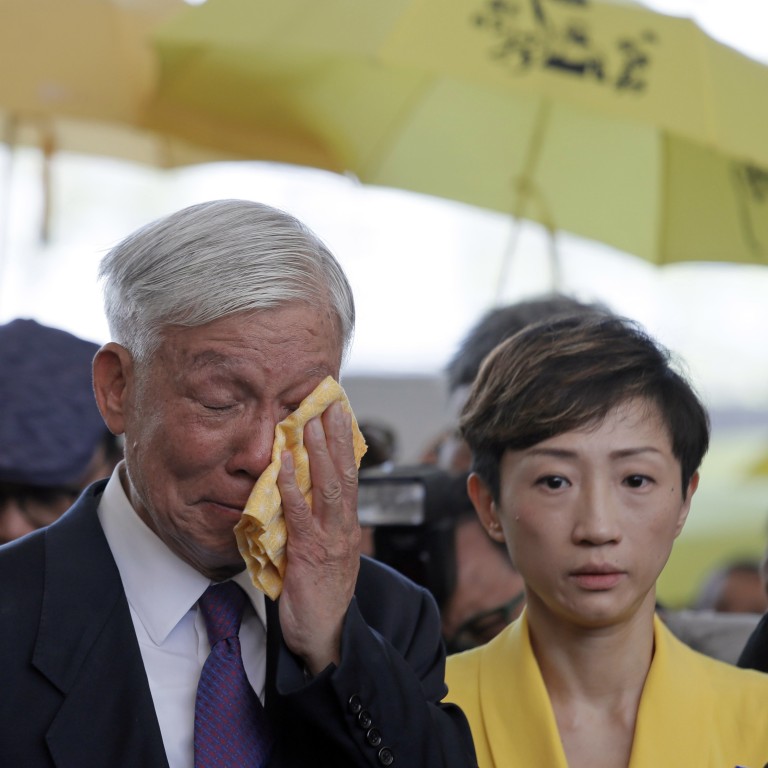“Go with the flow” seems the mindset of much of the Hong Kong judiciary, as it largely falls in with the government’s stretching of laws to their limits to punish and hobble its pro-democracy opponents.
This is painful but perhaps not surprising, given the obvious determination of Beijing to close the gap between judicial and executive authority.
Separation of powers is meaningless if the legislature, from which many of those directly elected in 2016
have been or may now be excluded, is a rubber stamp and judges live in fear of having their decisions overturned by the
National People’s Congress.
In sentencing the “umbrella” activists to prison, Judge Johnny Chan Jong-herng may have been correct in saying that they were naive to believe that their actions could advance democracy. But the judiciary is naive too if it believes itself to be immune to the patronage powers of the executive, or whispers from the central government’s liaison office. Chan was worse than naive in suggesting that two uncharismatic professors, one ageing cleric and three middle-level politicians could conspire to get tens of thousands of Hongkongers onto the streets for days on end.
Typically, the judge purported to represent the interests of “the ordinary folks who needed to use the carriageways”
obstructed by the protests. In reality, the greatest inconvenience was not to those using public transport but the bankers, officials and judges accustomed to being driven to work in Central. The masses who were inconvenienced were often the very same people (myself included) who took part in the movement. It is entirely clear that the government is dead set on finding scapegoats for the mass participation in an event that so embarrassed it and Beijing.
Presenting the “umbrella movement” as some sort of conspiracy is at odds with the facts of its evolution from a
tiny group to mass demonstrations which largely sidelined the original proponents. The openness of the intent of Benny Tai Yiu-ting and company contrasts with the secrecy of a Communist Party that
does not officially exist here but is actively conspiring to use
United Front tactics to undermine those who seek to strengthen “one country, two systems”, instead of being folded into a “Greater Bay Area” of
70 million.
Public nuisances, which the charges in the Occupy case relate to, are created daily. On every race day, or before and after a big football or rugby match, inconveniences are suffered by far more people than those who attend the events. Of course, we must tolerate these things, as society benefits. The same goes for demonstrations, transport strikes and so on. These are part of life in free and diverse societies. Meanwhile, everyday public transport users are the victims of nuisances – the delays caused by illegally parked cars and
tour buses which Hong Kong’s vast police force choose to ignore for reasons which go unexplained.
Yet the uncertain state of the relationship between politics, law and justice in Hong Kong is no excuse for tolerating the one-sided extension of extradition to Taiwan, Macau and the mainland. In
removing various economic crimes from its proposal under pressure from the business community, the government has as good as admitted these jurisdictions cannot be assumed to be trustworthy.
There is nothing to confine trumped-up charges to business affairs. There is a long record on the mainland and elsewhere of charges such as theft of (vaguely defined)
state secrets and smuggling of antiques being levelled against those who have irritated the authorities. Hongkongers are especially
vulnerable to anything judged on the mainland to constitute subversion of one-party rule or Beijing’s territorial claims.
But let me close on a more positive note at a time when Singapore is so often held out as a model. Yes, its environmental progress puts us to shame. Yes, housing here is a disgrace. But who bothers to note that about 30 per cent of Singapore’s population who are not citizens have almost no access to its public housing and that many of them have limited labour rights? Many
migrant workers accept whatever their employers provide, be it un-air-conditioned, crammed quarters or a spot in a corridor.
As for Singapore’s superior
GDP per capita, that is an illusion. In real money, its private consumption is just 34.1 per cent of its gross domestic product, compared to Hong Kong’s 66.7 per cent. Does that reflect gigantic savings? No. It reflects the fact that a huge chunk of income goes to foreigners, especially the multinational corporations on which the economy relies.
Singapore’s gross national income is 4 per cent less than its GDP. In the case of Ireland, a similar-sized, similarly foreign-dependent economy, gross national product is 25 per cent less than GDP. For Hong Kong, both GNI and GNP slightly exceed GDP. As for the independence of Singapore’s judiciary from the political leadership, I judiciously suggest it is for the reader to judge.
Philip Bowring is a Hong Kong-based journalist and commentator


